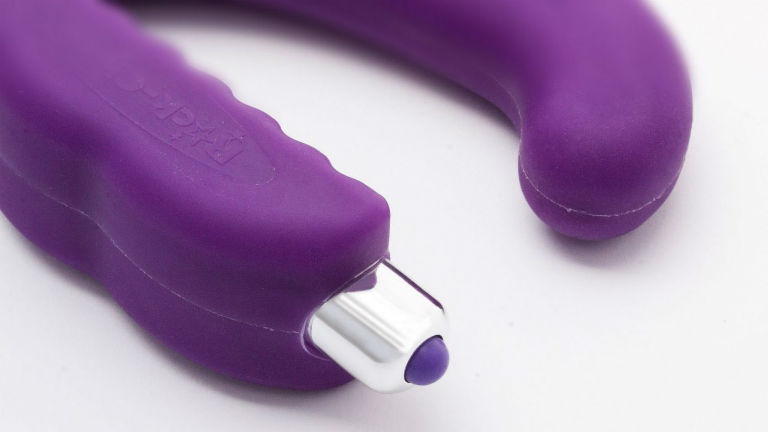
Pharmacies or Galleries? China’s New Sex Shops
There’s nothing sexy about the TOIs Boutique – certainly not its location, far north of the city centre in a complex of buildings as grey as the surrounding scenery. And not the office, a small suite on the 28th floor that’s crammed with desks and boxes full of stock. The only spark of life is in TOIs’ staff: four women in their twenties and early thirties, who sit in front of laptops, tapping away at what, for all we know, are insurance forms. But as it happens, they’re busy doing something else: selling sex toys.
“Physical stores cost so much – plus people normally just go there to browse. So we decided to start online,” says TOIs’ head of operations Chris Wu (吴小飘). Wu is a no-nonsense woman in her early 30s with delicate features and a tough demeanour – just the kind of pluck you’d expect from somebody who’s pioneering a business in one of China’s less explored corners of consumerism.
A NEW GENERATION
Wu first started TOIs in 2011, though the idea was planted years earlier. She says she was interested in toys from the time she was a teenager, but didn’t really fall in love with them until she went abroad. “I studied in England, and while I was there I saw some really beautiful, high-quality toys,” she says. “But after I graduated and came back to China, I couldn’t find any place that had products comparable ib quality. That’s why I wanted to start this company.”
As she tells her story, she lays out a collection of TOIs’ wares: bullet vibrators and dildos; lubes and massage oils; handcuffs and bondage gear; anal beads and Kegel balls. The products are uniformly sleek and modern-looking, defined by curves and colours that wouldn’t be out of place an Ikea or Apple store. Wu demonstrates the function of each toy, shifting from serious to almost giddy, as she lets the vibrators hop along the table. “I try almost all the toys myself,” she says. “I only choose ones that are good quality, have a nice design, and a good price – not super expensive. I want people to be able to afford them.”
Wu and her cohorts are part of a new generation of enthusiasts who are revolutionizing the sex toy business. Stories of young entrepreneurs – mostly women – have tumbled out of the media in the past few years. In addition to Wu, there’s Ma Jiajia (马佳佳), a 23-year-old who recently snagged the media spotlight with her spunky attitude and new shop called “Powerful” (泡否); Shauna Mei (梅雪), a former Goldman Sachs analyst whose online shop AHAnoir was written up by Bloomberg Business; and as long ten years ago Emily Meng, a twenty-something who opened a store called The G Spot (G点) in Beijing.
A NEW APPROACH
It’s not the fact of these stores’ existence that’s revolutionary, but rather their approach to sex and sexuality – namely, one that focuses on the pleasure and style of sex, elevating it to a kind of art. This is a turnaround from the way China has treated sex over the past 60 years.
Since its establishment in 1949, the People’s Republic has had a complicated relationship with sex, one that – despite the loss of traditional values – has placed it among some of the more socially conservative countries in the world. Among the first acts of the new Communist government was to issue a ban on prostitution and pornography. According to Richard Burger, author of the book Behind the Red Door: Sex in China, this was largely a means of ensuring social order: “Based on the Confucian ideal of the family as the ‘cell of society’, if the government can ensure the stability of the family, it could keep society in check and ensure its own longevity,” he writes. “Hence China’s portrayal of itself under communist rule as morally superior and pure, cleansed of any element that could tear at the fabric of the family and of society, like adultery, prostitution and pornography.”
Neither was stamped out completely, but efforts to sanitize the nation’s culture spread far and wide, installing sexual prudery as the government’s official stance, in law, the media, and everything else. The government largely succeeded in its efforts, and although Reform and Opening Up led to an influx of comparatively racy music and films from overseas – which was magnified exponentially by the internet – it still retained a chokehold on mainstream media. Even today, nudity and sex scenes are usually cut from imported films, much to viewers’ chagrin.
THE RISE OF THE “ADULT STORE”
It wasn’t until the 1990s that a government-sanctioned outlet for sexuality began to appear on the scene: sex shops. Adam and Eve is reported to have been the first first sex shop to open in China, when it started its business in Beijing in 1993. Back then, Burger writes, sex shops were an “offshoot of China’s healthcare sector” – they were seen as clinical spaces for sex education and treatment of sexual problems. “The thinking is… that a sexually satisfied population, a more contented population adds to the nation’s harmony,” Burger added in an interview with the Wall Street Journal. “If you don’t have a sexually satisfied population, they’re more likely to question authority.”
That might explain why China now seems to be teeming with sex shops; in 2011, state media estimated that China contained more than 200,000 sex shops, and that Beijing alone was home to more than 2,000.
Walking around the capital’s downtown, it’s easy to believe – in a lot of neighbourhoods you can’t walk more than five or ten minutes without spotting a storefront sporting the words “Adult Products.” Most of these stores are of the kind that Burger discusses in his book: small and dumpy with cheap toys and middle-aged proprietors. The contrast between this kind of store and the newer breed represented by shops like TOIs or Powerful is stark.
GALLERY OR PHARMACY?
Take, for example, two stores located less than a mile apart on Dongzhimen Nei Street (东直门内大街) in central Beijing. The first, Sweet Toys (甜蜜玩偶), is a picture of class, with a soft-lit, clean-lined interior that lends it the inviting ambiance of a gallery or coffee shop. The toys – mostly imported – are displayed on shelves along the wall, with testers placed prominently in the front. When we walk in, a skinny college-aged man is busy getting advice from the proprietress, an easy-going woman in her forties, about what toy to buy for a partner.
‘I’m not really sure what to get,’ he says.
‘Are you looking for something for a guy or a girl?’ she asks.
‘Both!’ he says, and she laughs affectionately. They go back and forth for some minutes, as she introduces a host of toys and explains their functions.
In addition to the dildos and vibrators are racks filled with DVDs, harnesses, nipple clamps, penetrative toys for men, and a whole room full of costumes for women.
When the customer leaves, the proprietress saunters off to talk. She tells us that the store has been open for seven or eight years, and continues to draw a range of customers. “Chinese, foreigners; old, young; men, women – they all come!” she says. Most of their money comes from people in their 30s or older, because they have the income to afford toys like these, which range from several hundred yuan to several thousand. Business, she intimates, has been good.
A ten-minute walk down the street, we come across another store, nestled among the hot pot restaurants that crowd Beijing’s famous gastronomic destination Gui Jie (簋街), also known as Ghost Street. This store looks like the thousands of others around Beijing: old and musty. Inside, it’s dark, and the walls are lined with crude, seedy-looking dildos and toys sculpted to look like lips or vaginas. Behind the counter stands a middle-aged woman in a white coat and spectacles. When asked the name of the shop, she laughingly retorts, “It’s right out there – ‘Adult Sex Products!’” So there’s no other name? we prompt. “No,” she answers. “That’s what we sell and that’s our name.” Before we can ask her anymore questions, a man enters, looks our way uneasily, and approaches the counter. He leans in and begins muttering conspiratorially. After a few sentences, the woman behind the counter comes out to shoo us away, saying, “Go wait outside, journalist – you can come ask questions, but not with customers; no, we can’t have you in here with customers!”
[Continue reading in Goethe Institut China]
